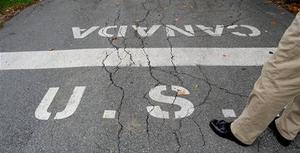Border securitySweeping overhaul of Canada-U.S. security
Prime Minister Stephen Harper and President Barack Obama will today (Friday) authorize the most sweeping overhaul of Canada-U.S. border and security cooperation in decades; the agreement gives Washington a much bigger say in Canada’s border security, immigration controls, and information-sharing with American law agencies; the agreement could pose the biggest challenge to Canadian sovereignty since the free-trade negotiations of the 1980s

The two nations will overhaul cooperation // Source: msn.com
After months of secret negotiations, Prime Minister Stephen Harper and President Barack Obama will today (Friday) authorize the most sweeping overhaul of Canada-U.S. border and security cooperation in decades.
The agreement will be signed at a White House meeting. It will open the way to a bilateral pact with the potential to give Washington a much bigger say in Canada’s border security, immigration controls, and information-sharing with American law agencies.
The Toronto Star reports that the deal, which is said to reflect Harper’s vision of closer U.S.-Canada cooperation, could pose the biggest challenge to Canadian sovereignty since the free-trade negotiations of the 1980s. It is prompting angry demands for the Conservative government to provide more information before this new set of negotiations with Washington goes any farther.
Harper has said little about the talks but a draft of a six-page agreement prepared for his and Obama’s signatures authorizes officials from both countries to begin work urgently on “a shared vision for perimeter security and competitiveness.”
It would essentially see Canada and the U.S. moving toward a shared security perimeter around the two countries. Besides improving anti-terrorist capability, the goal would be to unravel the increasingly congested Canada-U.S. border and ease bilateral trade.
“We share responsibility for the safety, security and resilience of Canada and the United States and we intend to address threats at the earliest point possible, including outside the perimeter of our two countries,” says the draft agreement.
It calls for closer cooperation among police, security and military officials, as well as shared border management facilities, increased exchanges of law enforcement information and enhanced cooperation by authorities on both sides of the border to verify travelers’ identities and “conduct screening at the earliest possible opportunity.”
“We intend to look for opportunities to integrate our efforts and where practicable, to work together to develop joint facilities and programs — within and beyond the United States and Canada — to increase efficiency and effectiveness for both security and trade,” the draft agreement said.
Liberal Leader Michael Ignatieff said Wednesday, “Everybody wants to make it easier to get goods and services across that border and people across that border but not at the price of Canadian sovereignty on issues like intelligence, on issues like immigration.
“This is basic stuff and Canadians are entitled to a public debate about this. We’re saying bring this back to the House of Commons, no secret deals,” he said.
The NDP’s Jack Layton said, “We think that there should be a thorough discussion here about the extent to which he may be compromising our sovereignty. We of course want to work with our friends in the U.S. on issues. But we don’t want to compromise our ability to set our own policies.”
Harper did not comment on the issue in the Commons Wednesday. In a television interview in December, however, he dismissed the idea that his government would harmonize Canada’s immigration and refugee policies with the United States.
“Obviously, we’re trying to work with our American friends to see how we can, you know, strengthen our security and economic arrangement in a way that obviously protects our interests and our sovereignty but also protects Canada’s vital access to the American market,” Harper told CTV.
As envisioned in the draft agreement, senior government officials in the prime minister’s department and the White House will be given four months to come up with a joint plan of action to implement closer security and border arrangements.
Canadian business has become increasingly alarmed about the security-related hurdles slowing commercial traffic at the U.S.-Canada border since the 9/11 terrorist attacks. At the same time, the deal being contemplated by Harper and Obama is raising questions about how much sovereign control Ottawa will have to concede to convince the Americans to streamline border procedures.
“It seems to be giving up way too much for getting hardly anything in return,” said Stuart Trew, trade campaigner with the Council of Canadians.
“There’s no guarantee the border’s going to become ‘thinner,’” he said in an interview. “This is potentially huge for Canada,” Trew added. “And regardless of what people think about free trade, I think the alarm bells go off when you start talking about sensitive policy issues such as immigration, refugee policy and privacy.”
The Harper government has been aware for some time that the proposed pact with the U.S. could prompt adverse reaction from Canadians.
A confidential communications strategy leaked recently from the department of public safety said, “Greater information-sharing is part of the initiative. The safeguarding of privacy and sovereignty will be of concern for Canadians.”
The deal might prompt objections from federal privacy commissioner Jennifer Stoddart and from groups concerned about Canadians’ civil liberties, the strategy paper said.
Harper and Obama are also expected to discuss the political upheaval in Egypt and energy initiatives.
